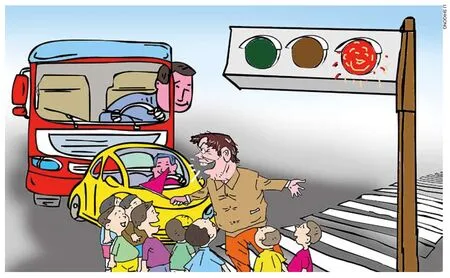Should Minor Criminals Be Given Leniency?
2010-03-15
The People’s Procuratorate of Ningbo, in east China’s Zhejiang Province, became the center of controversy when it implemented a program to deal with minor crime offenders,which is known as “good deeds for nonprosecution.” Under the program, offenders may be exempted from prosecution provided they carry out good community service work for a speci fi ed probation period.
Since the program came into effect in May, 13 offenders have passed probation periods and avoided being prosecuted. The latest example was in Ningbo’s Beilun District in early July, where the local procuratorate ordered a man who caused a traf fi c accident to serve as a traf fi c supervisor with a decision depending on whether or not to charge him based on his performance.
The new program’s implementation has strict conditions, said sources with the local procuratorate∶ It only applies to first-time offenders and minor crimes; the offender should be facing a sentence of less than three years if he or she is convicted; and there must be hard proof indicating the offender would not do harm to society in the probation period.
Supporters of the program say they believe it is bene ficial for realizing the purpose of punishment, maintaining fairness of justice and also enhancing ef fi ciency of lawsuits. They say a sharp increase in various crimes means judicial bodies are too busy to attend to all of them. Therefore,some countries allow procuratorial departments to decide whether to charge criminal suspects or not based on speci fi c conditions of cases and suspects. From their point of view, Ningbo’s program accords with current criminal policies supposed to temper justice with mercy. It can help mitigate social contradictions and promote social harmony.
On the other hand, opponents say the new program in Ningbo is inconsistent with existing laws. They insist procuratorial departments should either charge or not charge suspects. Conditional nonprosecution is an abuse that will inevitably bring about judicial corruption.
Not lawful
Wang Lin (Shanghai Morning Post):Designers of the program may not think the community service involved is “compulsory” since the program’s activation should have the consent of offenders. But, from careful analysis, we find the offenders are forced to do “good deeds” because that is the precondition of “nonprosecution.” What’s more, offenders who are subjected to the program have to comply with it for the period of probation. Only if prosecutors think the offenders have fulfilled their due social responsibilities and show regret will leniency be granted.
Because of this hidden element of force,“doing good deeds” becomes another form of punishment. In China’s laws, there isn’t any provision for compulsory community service. Some supporters think this method is similar to the “community service order”in Hong Kong. The community service order is designed to educate. This kind of punishment usually targets crimes “not serious enough for punishment but not minor enough for leniency” and usually applies to first-time offenders charged with minor crimes. But we should see clearly a community service order is totally different from conditional nonprosecution. The former is a speci fi c form of punishment handed down by a judge.

Conviction and sentencing belong to jurisdiction. Prosecutors are responsible for fi ling charges against criminal suspects.Conditional nonprosecution adds compulsory labor, whose nature is punishment, to the prosecution process. It invades the area of jurisdiction. This kind of extension of powers and adjustment between prosecution and jurisdiction simply can’t be decided by a local procuratorate.
Fan Zijun (www.chinavalue.net):The Criminal Law of China has principles and standards of sentencing for all kinds of criminal offences. It sets out specific and de fi nite stipulations on lesser punishment, probation and exoneration. Rulings should be made by judges independently based on evidence and related law. It undermines the current judicial system when the procuratorate in Ningbo decides, by itself, in the prosecution process whether to charge criminal suspects or not. It’s an illegal action infringing on jurisdiction. Frankly speaking, this socalled conditional nonprosecution is, in a disguised form, stealing jurisdiction from the court.
Such an “innovation” is retrogressive and not progress of China’s judicial system.
Wang Qingfeng (www.changsha.cn):How can offenders of law show regret during the probationary period? The answer is as simple as doing community service under Ningbo’s “good deeds for nonprosecution”program. But this program has an obvious fl aw∶ The “good deeds” are done because the offenders have no choice.
“A program manipulating loopholes in the law”—this is the first impression of the program for many people. In reality, not everyone is noble enough. Laws are meant to be ruthless. If we insist on showing leniency of the law, it’ll put us in an awkward situation.
The new program in Ningbo was drafted by a local procurator during a month-long convalescence. The whole process lacks any survey of public opinion, argument and revision. In essence, it only has theoretical feasibility.
The progressive aspect of conditional nonprosecution is worth praise indeed, but that shouldn’t be a reason for ignoring its potential risks. This kind of policy should be implemented as little as possible.
Wang Changlian (Changsha Evening Newspaper): It can be predicted each offender subject to the “good deeds for nonprosecution” program will behave very well during the probation period so as to pass any special test as a voluntary worker. That’s because, to save themselves, they will be more hardworking and earnest than at any other time. They will also be more law-abiding and faithful. But once the goal is achieved and the person is exempted from prosecution, they would go back to being the persons they used to be. Thus, the whole process will probably become a show of impudence from offenders.
Worth a try
Meng Tianlan (Luzhong Morning News): One must be punished once he or she violates the law. This is common sense for everyone. But many people have misinterpreted punishment as the ultimate goal of legal proceedings. Conditional nonprosecution can help people realize punishment is only one method.
Besides, punishment is a double-edged sword and not the most ideal method.Extremely vicious criminals deserve punishment but it’s debatable if others, who commit unintentional crimes or only cause minor damage to society, should be punished according to the same standards.
Punishment imposed on criminals by judicial bodies incurs costs. For example,during a person’s jail time, he or she is being supported by taxpayers, which is a direct cost.Besides, a person could have created more value in the society than in jail, which is the invisible cost. What’s more, it’s not easy for a person to become acclimated to society after jail time and find a new job. Some people even choose to go back to their old ways due to their failure to integrate into society, which is a bigger risk.
If a person unintentionally commits only a minor crime and is quite unlikely to repeat it, we should show leniency toward him or her. “Conditional nonprosecution”is a signi fi cant attempt to bring about this purpose. It makes people realize, again,that punishment is only a method, which is beneficial for creating an atmosphere of tolerance. Sometimes, tolerance works better than punishment. Some people argue there are now no relevant laws or regulations, but that’s the meaning of the pilot project. Improvement is acquired through changing.
Jiao Wanghua (Legal Daily):“Conditional nonprosecution” is likely to remarkably reduce the workload of judicial bodies and also eases pressure arising from too many cases and too limited judicial resources. More importantly, it doesn’t have the intention of pardoning offenders indiscriminately. For example, for traffic accidents,conditional nonprosecution will not apply to offenders involved in drinking and driving,hit-and-run, unlicensed driving and running red light incidents. Also, it’s stipulated the program’s activation should have the consent of concerned victims and the procuratorial departments should review the criminal and moral history of offenders.
It’s certain, when it is used improperly,conditional nonprosecution may lead to abuses of judicial power. But well-devised regulations can effectively prevent this problem from happening. Therefore, it’s theoretically practical to implement the “good deeds for nonprosecution” program for unintentional offenders who display contrite behavior.
Wang Jianzhou (Liaoning Legal News): In dealing with crimes, we have pursued absolute justice and relied heavily on punishment. From the perspective of the whole of society, absolute justice is only an ideal while relative justice is tangible and achievable. The “good deeds for nonprosecution” program has absolute,positive signi fi cance in healing the pain of society. So far, the program at least hasn’t brought about any negative effects in society.
The Criminal Law has definite regulations on conditions on exempting law offenders from prosecution. Procuratorial organs have a definite legal basis and rules about the implementation of nonprosecution rather than pardoning vicious people indiscriminately. We should be clear on that. ■
Dear Readers,
“Forum” is a column that provides a space for varying perspectives on contemporary Chinese society. We invite you to submit personal viewpoints on past and current topics (in either English or Chinese).
E-mail us at byao@cipg.org.cn
Please provide your name and address along with your comments.
